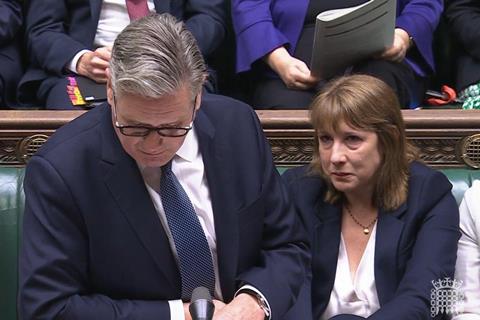As lawyers, we have been conditioned to appear emotionless. Remaining calm under relentless pressure is just part of the job. That’s why Rachel Reeves’ emotional moment this week struck such a chord with many of us: sympathetic, yes; but also perhaps a little uncomfortable.

Seeing the chancellor of the exchequer cry in the Commons is like watching a KC or a High Court judge tear up while delivering a verdict. It’s understandable, but almost unimaginable.
But how many of us have felt the same urge, only to suppress it? Maybe you’ve switched off the camera during a particularly bruising Teams call to compose yourself, or made a beeline for the bathroom to sob alone.
That was my reality for years. Being seen as strong, independent and capable is a hard act to sustain for years, especially when life throws you painful curveballs. I didn’t allow myself tears, I overworked, discovering constant anxiety, sleepless nights and frequent panic attacks – all underpinned by a sense that I was letting everybody down. It didn’t matter that I was a successful commercial property solicitor with a loving and happy family. I was exhausted, burning out.
While some mocked the chancellor, many have applauded her for showing humanity, an all-too-rare feat for politicians (and lawyers). While ‘crying it out’ might be necessary to release pent-up emotion, it is often a telltale sign of more going on.

There’s also a double standard. Women’s emotions are still too often viewed as weakness, while men’s might be labelled as passion. Compare the headlines written about Rachel Reeves to those celebrating tears from male footballers after a penalty shootout. It’s the same kind of pressure. Women are expected to be strong and sensitive, but tend to be patronised and punished for being either.
Gender aside, our profession is facing a burnout crisis. We know about the major impact stress has on our health, from mental health emergencies to heart attacks and strokes. It’s killing us, and it’s killing business: research I conducted through my platform, Authentically Speaking, found that smaller legal practices are losing an average of £315,000 a year in preventable attrition, with figures in the millions for larger firms.
So, could allowing our tears to flow at work help us regain some control? Maybe, but we’ll need more than just tissues. As lawyers and as humans, we need to learn the difference between masking emotions and regulating them. Pushing through for months, only to break down later, isn’t a strategy.
Stress management looks different for everyone. While clinically-backed techniques like meditation and talking therapy can help, there’s a danger in prescribing a strict diet of wellness to already overloaded lawyers. I call this wellbeing burnout, where even self-care feels like just another thing to fit into an already impossible to-do list.
To tackle stress in our industry, honesty about our emotions is a good first step. It might mean letting colleagues know when something is going on at home or at work; or stepping back from a punishing caseload when we are already overwhelmed. We can all help by resisting the urge to judge colleagues who show emotion, and by speaking up when things aren’t okay. Without this sense of safety, we can’t feel able to reach out for support early enough, if at all.
It’s also up to leaders. Fluctuating billing and recorded hours, skipped meetings, and personality changes are emotional warning lights for an employee approaching burnout. Firms should encourage – but not mandate – positive changes, creating access to support, and creating permission for staff to fully switch off from work where possible.
The chancellor’s tears were a rare glimpse behind the mask many of us in the legal profession wear every day; a valuable reminder that our feelings and experiences are always with us and always valid, no matter where we are.
Hannah Beko is a commercial property lawyer, coach, trainer, podcast host and author of The Authentic Lawyer































12 Readers' comments